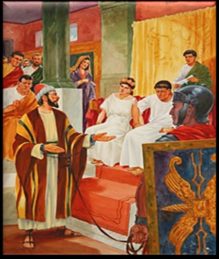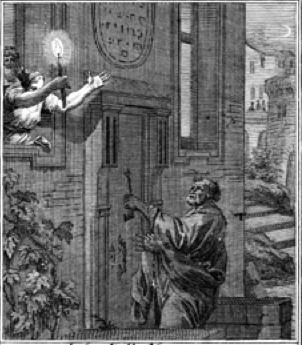Bernice great granddaughter to Herod the Great

The behavior and conduct of Bernice was scandalous even the citizens of Rome would not accept. Bernice was wealthy and probably beautiful and suffered from the wantonness of power. Bernice is not a good example of how women should conduct themselves. Yet we can still learn what is expected of Women of Christ by her behavior and conduct.
Bernice was the oldest daughter of Herod Agrippa I. Herod Agrippa I was the grandson of Herod the Great. His son Herod Agrippa II, was her brother, and was seventeen when his father died Bernice was sixteen and their sister, Drusilla, six. Bernice heard Paulís defense before her brother, Agrippa II. (Acts 25:13, 23). So on the next day Agrippa and Bernice came with great pomp, and they entered the audience hall with the military tribunes and the prominent men of the city. Then Festus gave the order and Paul was brought in. (Acts 25:23). Festus was the successor of Felix as procurator of Judea. (#5347 Strong 2001).
Bernice was married at the age of 13 to Marcus, a son of the Jewish official Alexander. It was after her the death of Marcus her father betrothed her to his elder brother, Herod of Chalcis. When the young widowís relationship with her brother, Agrippa II, deepened, there were rumors of incest. Bernice persuaded king of Cilicia, Polemo, to marry her then left him shortly afterward. (Elwell 1988, p 283).
Agrippa showed his loyalty to Rome by visiting Festus, procurator of Judea or the title for the governors, soon after his arrival in Caesarea. Bernice was an embarrassment because of her past marriages. Bernice was thirteen when she had married her uncle, Herod of Chalcis, and bore him two sons during their seven-year marriage. When Herod died in A.D. 48, Bernice began to live with her brother, who became the new king of Chalcis two years later. Bernice functioned as queen, while Agrippa II remained unmarried. It was according to Josephus and the Roman author Juvenal who noted that the rumor of an incestuous relationship between Agrippa and Bernice was widespread. Bernice married Polemo, king of Cilicia, presumably after A.D. 64 to suppress this rumor, only to desert him and returned to her brother. Agrippa and Bernice applied themselves to prevent the bloodshed that resulted from the Jewish revolt, which concluded in the fall of Jerusalem in A.D. 70. Agrippa and Bernice were supporters of the Roman general Titus and stayed in his assembly. Later she became the mistress of the Roman general Titus, who felt it necessary to leave her when he was made Emperor because the public opposed the marriage, Titus dismissed Bernice. (Kistemaker 1953-2001, p. 870-871).
The only mention of Bernice in the New Testament is the fact of her presence with her brother Agrippa at the examination of Paul at Caesarea. Bernice, King Agrippa and Festus listened to Paul’s arguments, and agreed that he had not broken the law. Notice that at each stage Bernice was included in the procedures. She was part of the invitation to hear the case. She helped preside at the hearing. She was part of the “they” to reach the decision. (Acts 26:30-32).
The behavior and conduct of Bernice was scandalous even the citizens of Rome would not accept. Bernice was wealthy and probably beautiful and suffered from the wantonness of power. Acts 25:23 tells us that Agrippa and Bernice came with great pomp, and entered into the place of the hearing. Bernice is not a good example of how women should conduct themselves. Yet we can still learn what is expected of Women of Christ by her behavior and conduct.
Women should arrange themselves in modest apparel, with a sense of honor, modesty, and regard for others, they should have a soundness of mind, self-control and sobriety. Women are not to intertwine their hair in gold, pears or costly arrays. Women of Christ are to become women professing godliness with good works. (1Timothy 2:9-11). 1 Peter 3-5 continues to state that the center of our soul or minds our thoughts, passions, desires, purposes and endeavors should not be corruptible. Women of Christ should be adorned with meekness and quiet spirit, which is in the sight of God of great price.
Gentleness or meekness is the opposite of self-assertiveness and self-interest. It stems from trust in God’s goodness and control over the situation. The gentle person is not occupied with self at all. This is a work of the Holy Spirit, not of the human will. (Galatians 5:23). This is the opposite of what we found with Bernice. We need to walk in the meekness of spirit. We are to dedicate the LORD God in our hearts and be ready always to give an answer to anyone that asks us for the reason of the hope that is in us with meekness and fear. (1 Peter 3:15).
Reference:
Elwell Walter A. and Beitzel, Barry J. ( 1988). Baker Encyclopedia of the Bible. Grand Rapids, MI: Baker Book House.
Kistemaker, Simon J. and Hendriksen,William (1953-2001). Exposition of the Acts of the Apostles, New Testament Commentary vol. 17. Grand Rapids: Baker Book House.
Strong’s Expanded Exhaustive Concordance of the Bible. Nashville: Thomas Nelson Publishers.
Cite Article Source
MLA Style Citation:
Holstein, Joanne ” Bernice great granddaughter to Herod the Great:.” Becker Bible Studies Library Oct 2014.<https://guidedbiblestudies.com/?p=1435,>.
APA Style Citation:
Holstein, Joanne (2014, October) ” Bernice great granddaughter to Herod the Great:.” Becker Bible Studies Library. Retrieved from https://guidedbiblestudies.com/?p=1435,.
Chicago Style Citation:
Holstein, Joanne (2014) ” Bernice great granddaughter to Herod the Great:.” Becker Bible Studies Library (October), https://guidedbiblestudies.com/?p=1435, (accessed).


